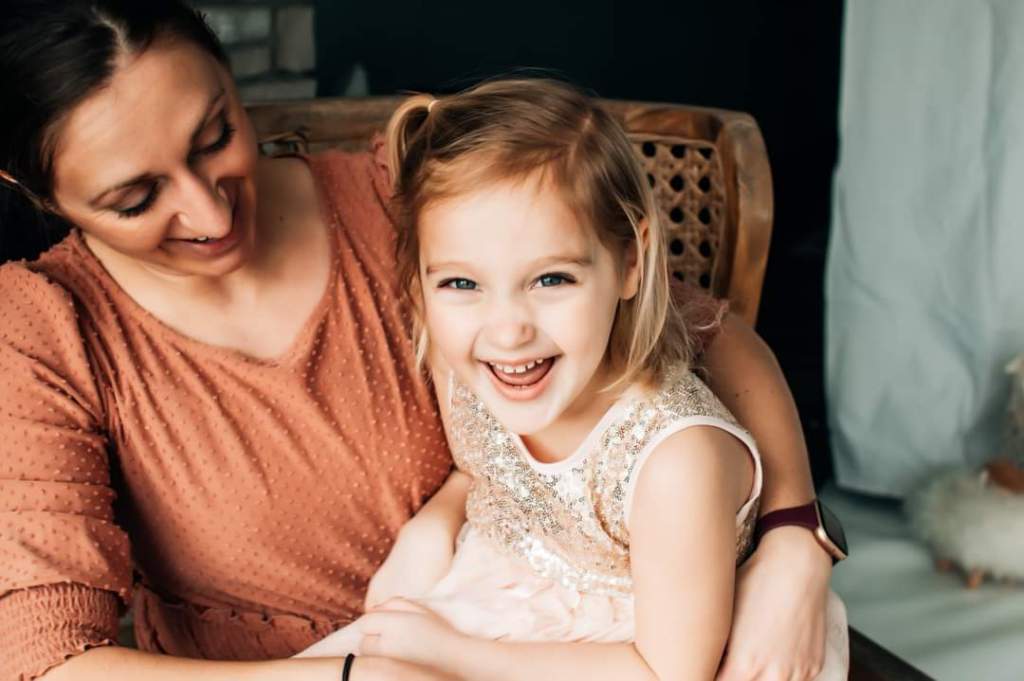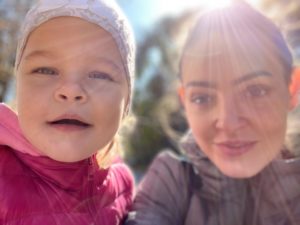Before you read on, make sure to check out Part 1 of our interview where we discuss what SLC6A1 is and Aubrey’s diagnostic journey. Today, we’ll be discussing what it’s like to grapple with a rare disease diagnosis, connecting with other SLC6A1 families, and advice for those facing a new diagnosis.
Receiving the SLC6A1 Diagnosis
As many people within the rare disease community know, receiving a diagnosis can take a long time. The diagnosis itself can be a somewhat bittersweet relief from knowing what is going on paired with frustration or fear from a lack of information. For the Vandenberg family, this was no different. The genetic counselor told them:
All signs are pointing to SLC6A1. Your child is presenting with these symptoms and her seizures are replicating that of other children with SLC6A1. You need to see the geneticist and get swabbed for a concrete diagnosis. There’s not a lot of information on this; there’s only four research articles on SLC6A1. In this type of circumstance, a rare genetic disease, parents are the experts.
And with that, the genetic counselor pointed them in the direction of SLC6A1 Connect. SLC6A1 Connect is a patient advocacy group founded by Amber Freed and Kimberly Fry, both mothers of children with SLC6A1, that works to support families, raise awareness, and raise funds to advance scientific research.
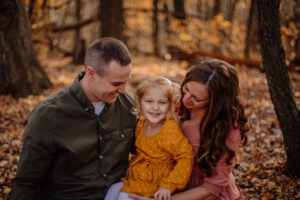
Connecting with Other Rare Families
Getting connected with SLC6A1 Connect and joining the various social media groups for families of children with SLC6A1 has been beneficial for Erika. She explains that this community is not just incredibly connected, but validating as well. For example, Aubrey’s neurologist has never treated anyone with SLC6A1 before, so all he has seen is a few research articles. But when she reaches out to the parent group, Erika says:
“I can hear their stories and see what’s worked for them and what hasn’t. Before a recent appointment, I posted a video of Aubrey’s eye flutters to see if other parents would classify them as a seizure. She’s talking through the video, so that’s not necessarily a ‘clinical’ seizure. But it was unanimous. Every parent agreed that she was having a seizure. No seizures were captured on the last four EEGs. Even at the last hospitalization, doctors saw and acknowledged the eye flutter, but it’s never classified as a seizure. It’s frustrating and it makes me feel crazy sometimes. Just hearing other people agree and say that it isn’t normal brings me some peace.”
Some parents share information in the group regarding how CBD oil, or certain vitamins and supplements, have helped their children. While you should always speak to a physician before adding anything into your child’s treatment regimen, Erika states that it can be helpful to see how other children can be helped – and how these options could potentially benefit Aubrey.
Finally, the group has been helpful in providing information on where fundraising is at in terms of finding a cure, possible gene replacement therapy options in the future, and how parents can get involved. Currently, there is a potential therapeutic option on the horizon: RAVICTI. This drug is approved for use in children with urea cycle disorders, but it is not yet approved for off-label use. It is being evaluated in a Phase 1 study for SLC6A1. Erika shares:
“It’s frustrating because there’s no way to help and because things move so slowly. To know that there’s a drug that the FDA has approved as safe, that comes with fewer side effects than many epilepsy drugs, and that can help our children, but we can’t get our child on it, is really tough. Our neurologist said that it sounds promising but until it’s in Phase 2 or 3, there’s not much anyone can do, even with the right try.”
Aubrey Today
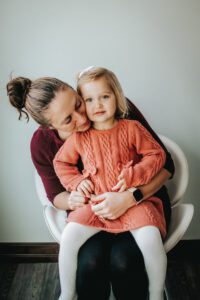
Today, Aubrey is four years old. She is strong, brave, and loving; her mother describes her as having a huge heart. At the same time, it can be difficult for Erika to explain how exactly Aubrey is doing. She says:
“She’s not good, but we haven’t seen a seizure since we were discharged last week, so that’s a positive. Her MRI results say mild cerebral volume loss. Four is such a critical age for learning so to see her losing skills is really hard. If she makes any progress, she’s robbed of it. Her speech isn’t consistently clear. She can’t write her name without tracing. Over the last two months, she’s started showing aggression at times.
If she had been diagnosed with something else, I feel like the grieving process would be different. We’d grieve but say, ‘Let’s make it the best quality-of-life. This is what her future might hold, but maybe she can break that ceiling.’ But knowing that regression is part of SLC6A1 and nobody can say how it’ll impact her, I don’t know if we ever know how to grieve with it.”
Offering Advice
When asked whether she had any advice for other families who are beginning this journey, Erika’s first thought was to get involved and find support. To have the support group through Facebook has been huge for her family; they’re grateful to Amber for getting that moving. For families who are newly diagnosed, finding comfort and support in the Facebook group can be crucial. Erika explains:
“As supportive as family can be, they don’t understand what you’re going through. It’s just not the same as reaching out to another family who has gone through the same thing. Who understands that it isn’t silly to be devastated when you’re playing hide-and-seek and your child starts counting wrong when you know they’ve counted correctly before. Having that community is a great resource.”
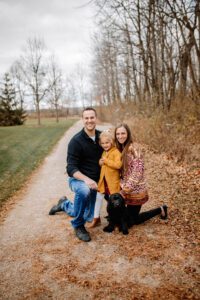
On a more personal level, Erika encourages parents to always advocate for their children. She says:
“You are your child’s best advocate. If you’re seeing a behavior or something concerning, continue bringing it up until you get an answer. Don’t hesitate to reach out to a specialist, even if you need a plane ride to get there. Specialists can address behaviors without labeling your child as having anxiety or OCD. Six months ago, we were just starting to see these behaviors from Aubrey. Why would I want to add a medicine for anxiety or ADHD when we can’t get her seizures figured out? Specialists can help you with this process. But most importantly, don’t ever give up fighting for your child.”


